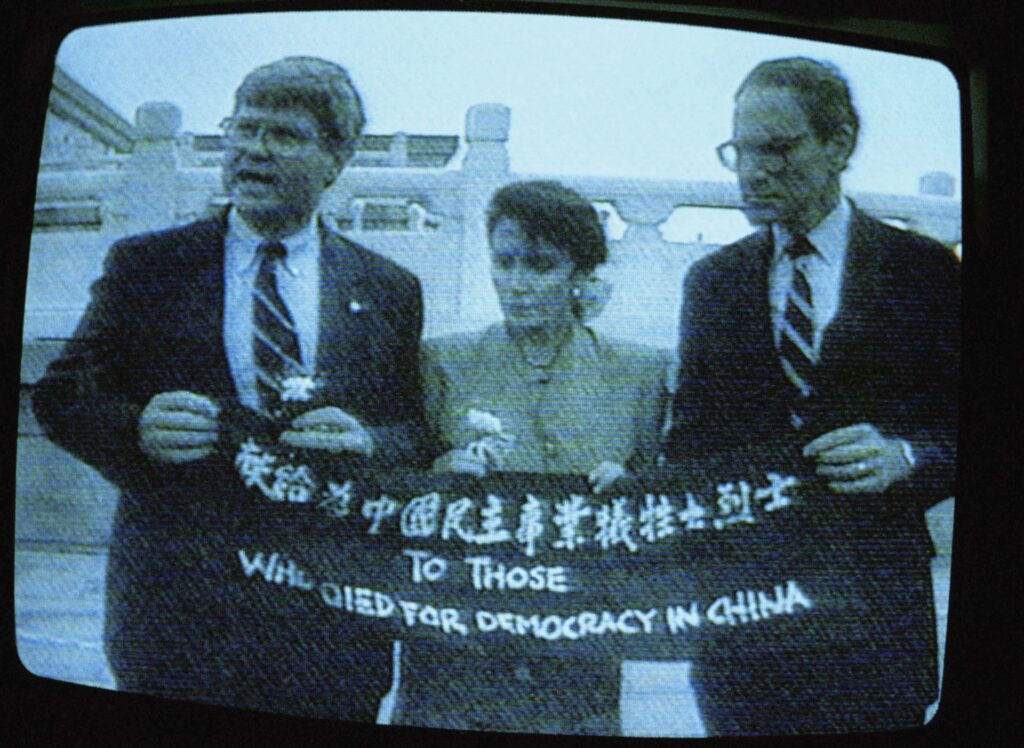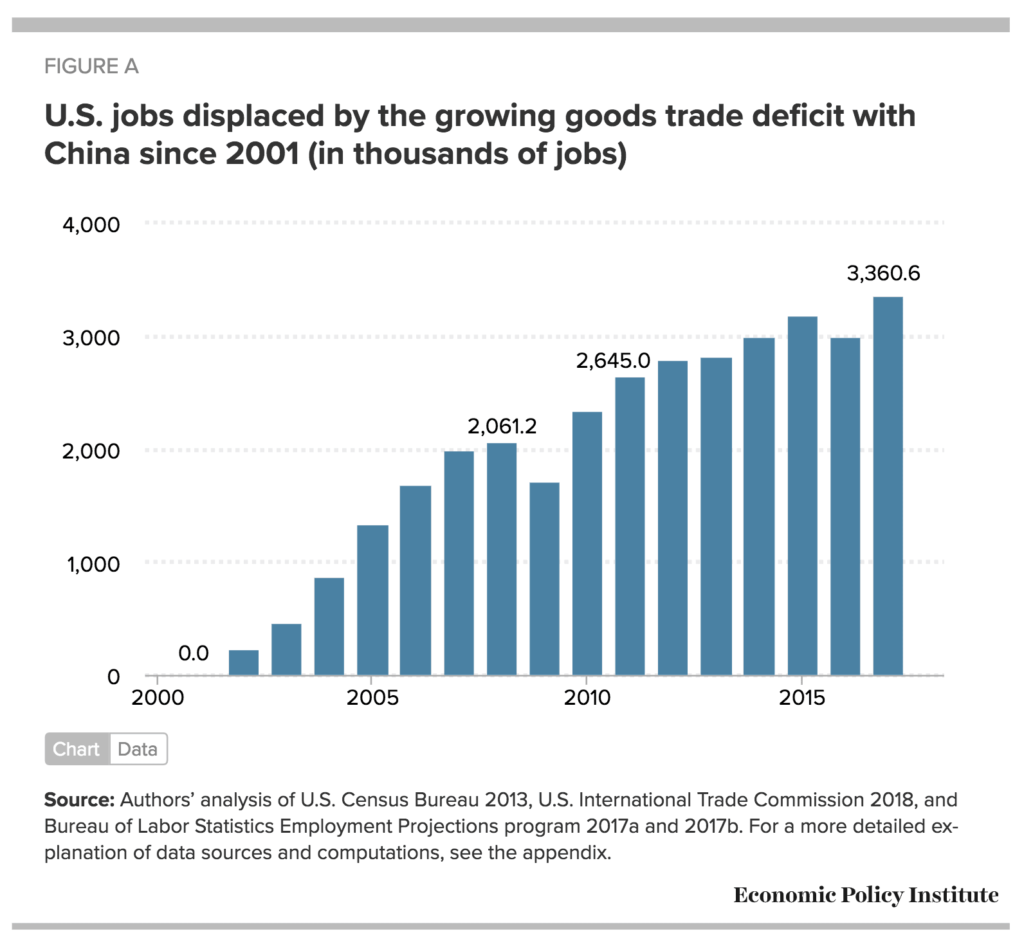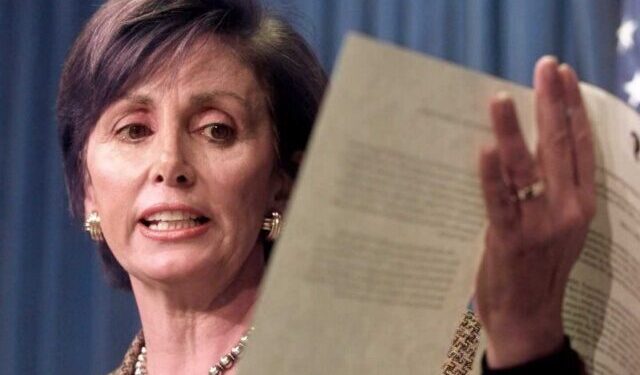In 1996, Rep. Nancy Pelosi took to the House floor with a fiery speech, warning about the risks of granting China Most Favored Nation (MFN) trade status. Back then, it might have seemed like just another political debate, but fast-forward nearly three decades, and her words now read like an eerie prophecy.
Pelosi argued that this trade deal was a one-way street—China got access to U.S. markets while American companies faced steep tariffs and limited market entry in China. She highlighted a staggering trade deficit, a loss of American jobs, and an economic imbalance that would only grow worse. At the time, China had a $34 billion trade surplus with the U.S., a number that had skyrocketed by 1,000% since the Tiananmen Square massacre. By her calculations, U.S.-China trade was creating millions of jobs—for China. Meanwhile, American workers, especially in manufacturing, were losing out.

But her warnings fell on deaf ears. The MFN status was granted, trade with China expanded, and the economic shift she feared became reality.
So, what actually happened? A 2018 report by the Economic Policy Institute (EPI) found that between 2001 and 2017, free trade with China led to the loss of 3.4 million American jobs. The hardest-hit? The manufacturing sector, which accounted for 74% of those job losses. States like California, Texas, and New York saw the largest total job losses, while industrial states like Ohio, Pennsylvania, and Michigan suffered the most per capita.
And it wasn’t just numbers on a spreadsheet—it was communities collapsing. When factories shut down, it triggered a domino effect. Local businesses closed. Public schools suffered. Mental health crises and addiction rates soared. In places like Youngstown, Ohio, population decline led to empty homes and entire neighborhoods turning into ghost towns. In some areas, drug overdose deaths increased by 400%.
What makes this story even more fascinating is that Pelosi, who once passionately opposed free trade with China, is now criticizing tariffs meant to reverse these same policies. Recently, she attacked Donald Trump’s trade measures, calling them a “reckless tax hike” on American consumers. But if her 1996 speech was any indication, one could argue that a tough stance on China is exactly what she once championed.
The question now is: How do we fix this? The debate over trade policy with China is far from over, and while there’s no easy answer, one thing is clear—ignoring the economic impact of unbalanced trade has already cost America dearly.
President Donald Trump has taken decisive action to safeguard American interests by shutting down trade exemptions for China and Hong Kong. This bold move, part of a sweeping executive order imposing tariffs on multiple nations, directly targets deceptive shipping practices that have long undermined U.S. trade laws.
For years, China has exploited the “duty-free de minimis” loophole, which allowed shipments valued at $800 or less to enter the United States without import duties or taxes. The Trump administration uncovered how the Chinese Communist Party (CCP) and Hong Kong traders manipulated this exemption by breaking large shipments into smaller parcels—evading scrutiny and, in many cases, smuggling illicit substances like fentanyl into the country. By closing this loophole, Trump is taking a major step to cut off the flow of dangerous drugs fueling America’s opioid crisis.

This crackdown is part of Trump’s broader strategy to end unfair trade practices, known as “Liberation Day.” The plan aims to correct trade imbalances that have crippled American businesses for decades. Breitbart economics reporter John Carney praised the move, highlighting the long-standing disadvantages the U.S. has faced in global trade.
“Consider Europe’s VAT regime. A German automaker exporting a car to the U.S. does so tax-free—thanks to a VAT rebate. Meanwhile, an American automaker shipping a car to Europe pays embedded U.S. taxes and a European VAT upon entry. One enjoys a de facto export subsidy, while the other faces a tax wall,” Carney noted. “The WTO, in its infinite wisdom, allows this disparity and has repeatedly blocked American attempts to address it through legal or tax-code innovations.”
Trump’s crackdown on China’s abuse of trade exemptions goes beyond economics—it’s about saving American lives. China remains a primary source of fentanyl and other deadly opioids that have devastated communities across the U.S. By shutting down the de minimis loophole, Trump is taking direct action to curb the illicit drug trade while putting economic pressure on China.
With these new measures in place, China and Hong Kong will no longer have free rein to exploit America’s trade system. Trump’s commitment to fair trade continues to reshape global commerce, proving once again that his administration prioritizes American workers, businesses, and national security.
As the fight against unfair trade and illicit imports intensifies, one thing remains clear: President Trump is leading the charge to put America first.
What’s your take? Should the U.S. continue toughening its trade stance, or is there another way forward? Reply and let me know your thoughts!




















